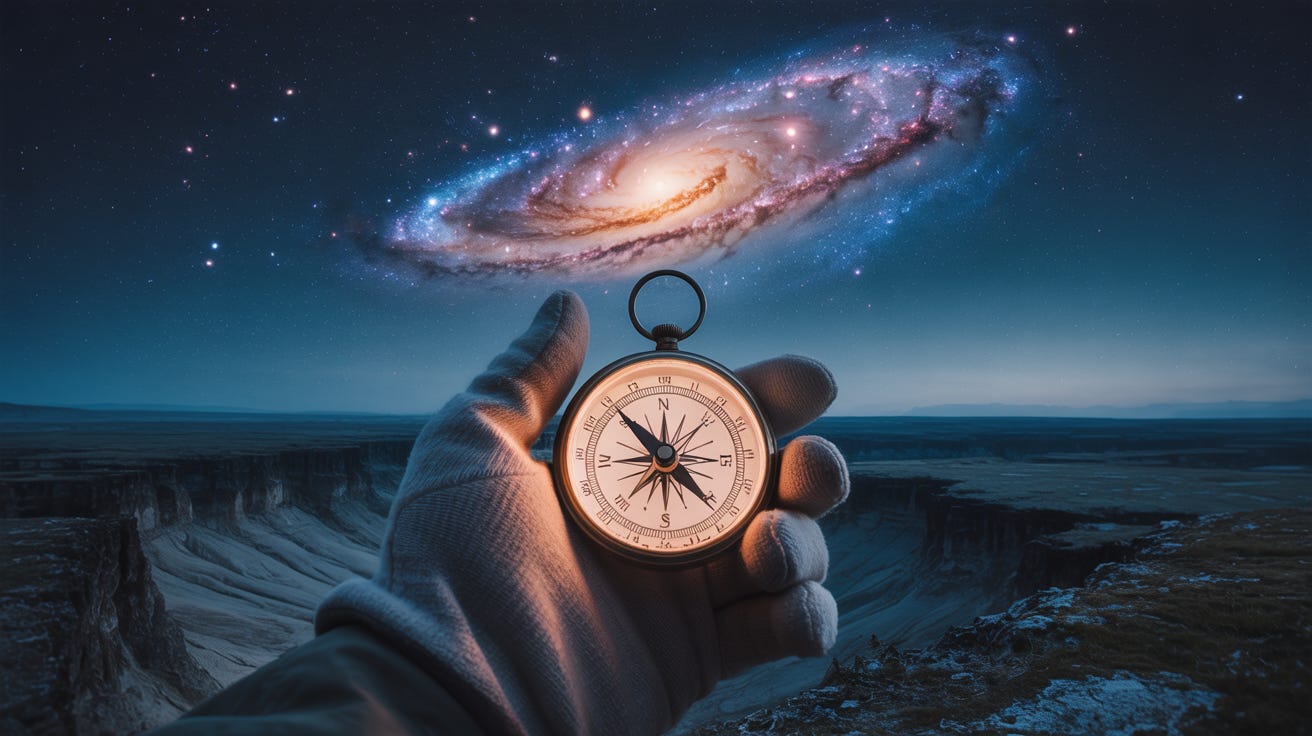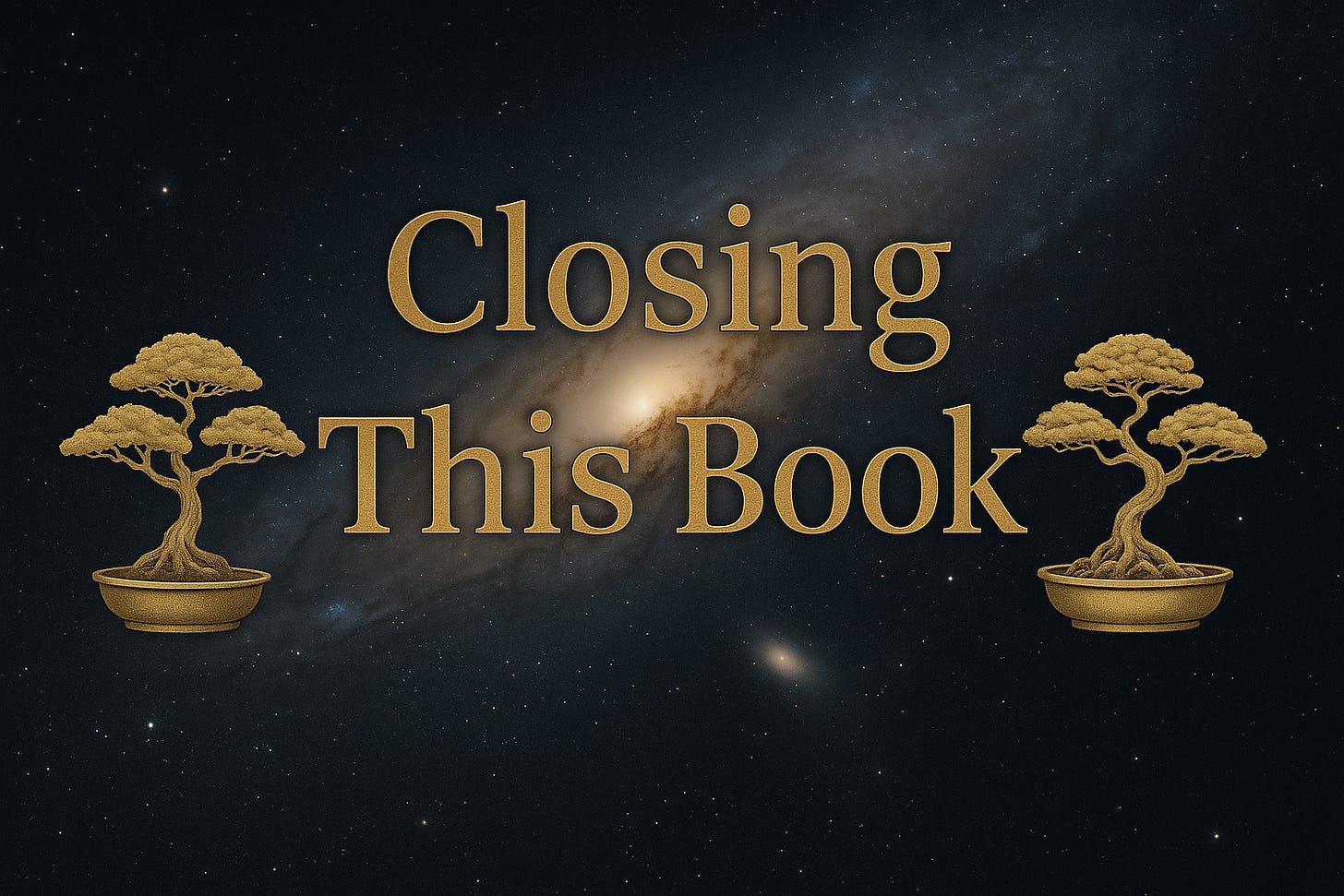Max Amarria - Personal Wisdom For A Modern World
Book 5: How to Find Purpose
This image really captures the meaning of Max Amarria and its books providing you a compass to the future, to the stars, and how to find purpose while doing so. Follow your course among the stars and be the guide for others with this compass.
Chapter 1: Chart Your Course Among the Stars
By Charles White
Why are we here?
Not in the metaphysical sense—but in the practical one.
What gets you up in the morning? What sustains you when applause fades, when pressure mounts, when success tastes hollow? What makes the long arc of your life mean something?
In Max Amarria, we seek meaning not in mysticism or dogma, but in rational humanism—in the choices we make, the people we serve, the ideas we cultivate, and the lives we touch. Meaning is not handed down from the stars, or from a crown in the sky. It is constructed, decision by decision, in how we spend our time and focus our will.
Purpose is a structure.
Purpose says “this matters, even when it doesn’t feel good.”
Many people confuse purpose with occupation. But your job is not your meaning—though it may contribute to it. And your meaning is not someone else’s to define—though it will always echo outward through your relationships.
The quest for meaning is ongoing. It adapts. It matures. It answers to context.
You may have one purpose at 28, and another at 65.
You may carry several purposes at once—parent, builder, mentor, healer, explorer, rebel.
And yet, despite their forms, all true purpose shares a few signals:
– It connects you to others.
– It outlives a single moment.
– It resonates when no one is watching.
– It pulls you forward, even on your worst days.
My own quest for meaning has curved across disciplines and deserts. From my time supporting deep space exploration to shaping knowledge systems at JPL… from the windswept tower of a fire lookout to the dusty camps of Black Rock City… from artificial intelligence ethics to gaming communities in Iceland…
Meaning followed where I brought my full self to serve something bigger.
You don’t find meaning like you find a coin on the sidewalk.
You forge it—by putting your energy into things that endure, connect, heal, or expand.
And if you feel lost, uncertain, or stalled—it doesn’t mean you’ve failed.
It means you’re still in the process of shaping meaning.
That, too, is holy work.
Purpose rarely announces itself. It hides in plain sight—woven into routines, disguised as struggle, masked by distraction. It doesn't always arrive with clarity, but with quiet nudges: a fascination that won’t fade, a task that feels heavier when left undone, a joy that deepens when shared. For many, it takes extra effort to see their purpose clearly—like trying to glimpse starlight through clouds, or recognize a melody within noise. Others may not see it in you either, not at first. But when it reveals itself—through action, alignment, or awakening—it becomes undeniable. Once you see your purpose, you cannot unsee it. It roots itself into how you walk, how you decide, and how you are remembered.
It is then you realize your meaning on your course among the stars.
Actions for Chapter 1
Contemplation:
Reflect on a moment in your life that felt deeply meaningful. What made it so? When did you last feel pulled forward by something greater than yourself?
Practice:
Write down three actions you took this week that contributed to something beyond your immediate gain. Identify one value you hold deeply—and take a single step this week that aligns your time or energy with that value.
The Commandment
“Thou shalt seek thy meaning not in destiny, but in contribution—for purpose is built where action meets values.”
Meaning is not given.
It is made.
Make it well.
Chapter 2: How to Stop Saying “Just a Job”
By Charles White
Work is not just what you are paid to do.
It is what you bring into the world—with your hands, your mind, your voice, or your care. It’s not just a job, it is a contribution and participation.
In Max Amarria, we honor work not as a transactional burden, but as a form of participation in the unfolding of civilization. Work is how we build, maintain, repair, and imagine. It is how we create structure, preserve memory, and shape the future.
But somewhere along the line, society flattened the meaning of work.
It became measured only in income, prestige, or hours punched.
And worse—some forms of work, especially caregiving, homemaking, or volunteering, were stripped of honor because they weren’t “profitable.”
We reject that.
The nature of work is broader and more beautiful than the economy alone can measure.
A person growing a garden is working.
A person caring for an elder is working.
A person guiding a spacecraft safely to Mars is working—just as surely as the technician who swept the floor of the cleanroom.
I’ve worked across a spectrum—paid, unpaid, visible, invisible.
I’ve stood behind microphones and beside solar panels.
I’ve fixed networks, wrangled knowledge systems, and run logistics in a desert.
And I’ve heard people say, “I’m just a volunteer,” or “just a temp,” or “just a side gig.”
No.
If your labor adds value—emotional, physical, or societal—then it matters.
Your work has meaning (see chapter 1), whether or not the world has yet assigned it a price tag.
But this leads to something many doctrines avoid, and Max Amarria addresses directly:
Pleasure is Not a Sin
You are allowed to enjoy the fruits of your labor.
You are allowed to rest, to feast, to laugh so hard you cry, to dance until your knees ache, to taste the salt of skin or sea without shame.
You evolved not just to toil, but to feel.
Pleasure is not an indulgence—it is part of the reward loop of survival.
It reminds you that life is not only obligation. It is also beauty.
Many dogmas have tried to suppress pleasure.
They taught that the body was corrupt, that desire was dangerous, that joy was something to feel guilty about.
Max Amarria sees that as a tragic error.
Because when you treat pleasure as sin, you drive it underground—into secrecy, addiction, or denial. But when you welcome it with awareness, with limits, with reverence, pleasure becomes a celebration of existence.
You are not here to suffer your way to worth.
You are here to participate in the world’s fullness—with both effort and delight.
Monday Morning Blues
In Max Amarria, we do not accept the phrase “it’s just a job” as a dismissal of meaning.
Over the centuries, labor has been stripped of joy, reduced to obligation, and coated in cynicism. Monday mornings become a ritual of dread. The alarm clock is a summons to suffering. We joke about the grind because to cry would be too vulnerable. But behind those jokes are real people whose spirits are dimming—who feel trapped in lives measured by punch clocks and deadlines, not by passion or purpose.
Work—at its best—is collaboration, creation, and contribution. It is not merely toil but a sacred rhythm: hands shaping the world, minds solving problems, hearts aligning with a greater good. There can be pleasure in that. Even hedonistic delight—in shared goals, creative flow, or the quiet triumph of a job well done.
In Max Amarria, we must reawaken this truth in you.
We remind people that their labor is not a punishment, but a form of expression. That joy in work is not a luxury, but a right. That in building together, sweating together, dreaming together—we remember we are still part of something bigger.
Let us then write this not as fantasy, but as a return. A return to work as a noble, even pleasurable, act of living.
And in doing so, we may just save some lives.
Actions for Chapter 2
Contemplation:
What forms of unpaid, unrecognized, or quiet work have shaped your life? What assumptions do you hold about what makes work "valuable"?
Practice:
Acknowledge someone’s unseen work—thank a caregiver, a volunteer, or someone often overlooked. Reframe your own daily task not as a chore, but as a form of contribution. Observe how that shift affects your mood.
The Commandment
“Thou shalt honor thy work not by its wage, but by its worth—and permit thyself the joy of being alive within it.”
Work is sacred.
Pleasure is sacred.
Neither are shameful.
Together, they create the balance that makes life not just sustainable—but luminous.
You are allowed to rest.
You are allowed to laugh.
And you are allowed to feel proud of the work you do—whatever form it takes.
Chapter 3: The Spark of Your Creation
By Charles White
You are here to create.
Not because the world demands it.
Not because it will make you famous.
But because you can—and that is one of the rarest abilities in the known universe.
In Max Amarria, creation is not reserved for artists.
It is the act of making something that did not exist before.
A sculpture, a meal, a poem, a camp, a new approach to an old problem—if it bears your fingerprints and came from your fire, it counts.
Creation is not decoration. It is participation.
In the grand unfolding of the human experience, every creation—no matter how modest—is a flare sent up to say, I was here. I felt this. I tried.
I’ve sent up a few flares of my own.
In the cities of dust and fire we call Burning Man, I’ve helped build mutant vehicles that crossed deserts not just with wheels, but with stories.
The Mars Rover Art Car was not just a machine—it was a declaration of curiosity.
Even the Choo Choo Shoe rolled across the Playa as a tribute to joy itself.
But the creation I’m most proud of—the one that still stands under the stars long after the dust has settled—is the Black Rock Observatory. I co-founded it with others who shared a wild idea: to bring the cosmos to the desert, and let anyone look through a telescope and see Saturn’s rings with their own eyes. It is now stewarded by a nonprofit, and year after year, it shows the universe to tens of thousands of wanderers, dreamers, scientists, and seekers.
The Black Rock Observatory isn’t just my creation—it’s my offering to humanity.
Still burning by the volunteers that bring it. A flare of wonder on a dusty playa.
These were creations born of sweat, team effort, and love—not commerce.
And they fed something that work alone cannot feed: the creative instinct.
Creativity is not a luxury. It’s an evolutionary advantage.
You solve problems differently when you allow yourself to create without fear.
You bond differently when you co-create with others.
You endure differently when you can transform pain into art, laughter, or meaning.
And yet, so many adults say, “Oh, I’m not creative.”
As if creativity was a gene you either inherit or lack.
But here’s the truth: You were creative before you were obedient.
Before school taught you to stay in the lines, you scribbled with abandon.
Before someone told you it had to be perfect, you made things because it felt right.
Creation is the spiritual sibling of play.
It invites wonder, flow, novelty.
It breaks stagnation. It dissolves dogma.
And sometimes, it even saves lives.
Don’t underestimate what your creativity might unlock—for you or for someone watching quietly nearby.
Create.
Actions for Chapter 3
Contemplation:
Recall a time you made something just because you wanted to. What did it feel like to create without expectation?
Practice:
Make something this week—anything—with no concern for whether it's good, profitable, or shareable. Revisit a creative pursuit you once loved, even briefly. Let play re-enter your practice.
The Commandment
“Thou shalt create without apology, for to bring something new into the world is to declare: I am not only surviving—I am becoming.”
So make something.
Anything.
Burn it later if you must.
But let the spark live.
Because when you create, you give your soul oxygen.
And in return, it gives you back momentum, and meaning.
Chapter 4: The Ethics of Your Influence
By Charles White
Influence is not always a choice.
Sometimes, simply by being visible, consistent, or effective, you become an example—whether you meant to or not.
And when that happens, a question follows you:
What will you do with the power others give you?
In Max Amarria, influence is not treated as status. It is treated as responsibility.
Because whether you’re influencing one child, one team, or an entire public moment, your actions shape others—especially when they’re watching silently from the side.
You do not need a podium to have influence.
You just need someone who listens. Someone who trusts. Someone who says, “That person’s choices matter to me.”
And when that happens, your choices are no longer yours alone.
This is where ethics comes in.
Because not all influence uplifts. Some influence deceives, distracts, or dominates.
History is filled with people who used their voice to lead others astray—because it was profitable, flattering, or easy. The con is always tempting.
Ethical influence requires more than just being right.
It requires being consistent.
It requires knowing when to sit out—and when to stand firm, even when it costs you.
I’ve lived this.
During the Pathfinder mission, when humanity first touched the surface of Mars in the new era of exploration, MSNBC, ABC, and CNN came with cameras, looking to capture the moment. The world was watching. It was the golden hour of media, celebration, and recognition.
But I wasn’t in the footage of broadcasted and recorded history, my co-workers were.
Not because I wasn’t part of the story, but because I held an ethical position that the project manager did not like. I chose principle over proximity to the spotlight.
It would’ve been easier to bend.
But I didn’t.
And I don’t regret it. You have heard of being dead wrong, but in this case I was dead right. I held my integrity at that cost. Others knew, they watched.
Later, that same integrity would be recognized. I was promoted—not because I played the game, but because I respected the mission enough to hold the line. To not be seen when it mattered most, because being seen wasn’t the point.
This is the paradox of ethical influence:
You may not be rewarded immediately.
You may be sidelined, mocked, or forgotten.
But the record remembers. People remember.
And more importantly—you remember.
You remember whether you compromised, or held your ground.
And those who learn from you—years later—will not thank you for your silence.
They will thank you for your clarity.
That’s influence.
Actions for Chapter 4
Contemplation:
Who are three people you influence, even without trying? How might your actions ripple in their lives? Have you ever compromised your values to stay visible? What did it cost?
Practice:
Choose a moment this week to speak with clarity—even when it’s uncomfortable. Reflect on a principle you would stand for, even if it meant losing approval. Write it down as a reminder.
The Commandment
“Thou shalt wield influence with integrity, for what thou normalizes becomes the path others may follow blindly.”
Be cautious with your spotlight.
Use it to illuminate, not blind.
Be intentional with your voice.
And when the cost of truth is visibility—let the truth stand, even if you must step aside.
Influence is not about how many follow you.
It’s about what they become because they did.
Chapter 5: The Legacy of Your Contribution
By Charles White
You cannot choose whether you leave a legacy.
You can only choose what kind.
In Max Amarria, legacy is not a monument. It is not your résumé or your fortune.
Legacy is what continues in others—after you have left the room, the project, or this life. It’s the pattern of influence you set in motion, long after your name fades.
We often think of legacy as something tied to recognition.
But some of the most enduring legacies are quiet.
A lesson. A repaired system. A protected child. A tree, shaped and left in trust.
I know this deeply through the practice of bonsai.
To tend a bonsai tree is to enter a multi-century conversation.
The tree you wire, trim, and guide today may not reach its true form in your lifetime.
You are one of many. One caretaker among generations.
You don’t impose your vision—you contribute to its story.
Legacy works the same way.
You do not get to complete the whole arc.
But you can shape its direction.
Sometimes, you’ll never know how far your contribution reached.
Sometimes it will pass through a thousand hands before someone names it.
Sometimes your job is just to not break what was working—and to quietly leave it better than you found it.
That is enough.
That is holy.
A Parent’s Legacy
One of the first blessings I gave as Space Pope was not for a spaceship or a captain, but for a future parent.
They came to me—nervous, joyful, standing at the edge of something bigger than they could yet grasp—and asked for a blessing over their coming child.
I gave it freely, but with a truth that still echoes in me:
“You, as a parent, have but one job: memories. Good memories. Create them in your child.”
You see, it’s not always the big moments that define us.
It’s the small ones.
The quiet glance. The tone of voice. The dinner ritual. The bedtime story.
The “I’m proud of you,” spoken when it wasn’t expected.
These become architecture.
They root into the child’s sense of self—and grow outward into their life.
And here’s the deeper truth I shared that day:
“Think how the smallest thing you do may be remembered. Let that temper your words. Let that shape your decisions. Make good memories—for that shall be your legacy, especially if you create bad ones.”
Was your contribution for sitting down for make believe tea, or walking past the table?
Was your contribution for talking too much, or not saying anything?
Legacy, for a parent, is not measured in achievements.
It’s measured in how a child remembers the feeling of being yours.
There are many things we gather through life, but one thing you should try to leave is legacy. A good one.
Actions for Chapter 5
Contemplation:
What do you hope others will carry forward from knowing you—not in words, but in behaviors? Who shaped you through quiet acts of care? How did that influence endure?
Practice:
Plant something—literal or figurative—that will outlast your presence. Begin a tradition, however small, that others might continue in your absence.
The Commandment
“Thou shalt contribute to the world as one link in a long chain—shaping what follows not with fame, but with fidelity to care.”
You are a memory-in-the-making for someone.
You are a root system.
You are a steward.
Make your touch gentle.
Make your lesson clear.
Make your presence kind.
For in the end, your legacy is not carved in stone.
It is carried in others.
Chapter 6: The Joy of Service
By Charles White
There is a kind of joy that does not shout.
It does not boast or demand recognition.
It appears quietly—when you do something for someone else, with no expectation of reward.
That is the joy of service.
In Max Amarria, service is not seen as sacrifice, but as fulfillment.
It is the moment when your effort intersects with someone else’s need.
It is where purpose transcends self.
Some of the most meaningful moments of my life did not happen in launch control rooms or in the spotlight. They happened on mountains, in radios, and through simple acts of care.
As a U.S. Forest Service volunteer fire lookout, I stood alone on Vetter Mountain—watching the sky, scanning the ridgelines, becoming a sentinel in the quiet.
No headlines. No applause. Just observation, vigilance, and love for the land.
As a Public Information Officer during fires, I didn’t wield a hose or fly a chopper.
I gave people clarity. Reassurance. Maps. Facts. I helped families understand what they were facing. That was my part. That was my joy.
And across years at NASA, I served in ways that many would overlook.
Sometimes my job was to fix things no one else saw, or to speak truths quietly in rooms where loud voices echoed.
I did not always lead. But I always contributed.
Service, in its purest form, is not about titles.
It’s about presence. It’s about giving what you can, when it’s needed, without needing to own the result.
And here’s the secret:
Service doesn’t drain you.
It renews you.
Because when you give from purpose, not performance—something inside aligns.
Service Is Scalable
You don’t have to wait for a grand mission.
You can serve through listening.
Through kindness to the stranger.
Through showing up reliably in someone’s life.
Service scales to your life.
You don’t need wealth to give value.
You don’t need fame to offer light.
Sometimes the smallest act—done with sincerity—is the one someone carries for the rest of their life.
And when service becomes a habit, you begin to see the world differently.
You stop asking, “What do I deserve?”
And you start asking, “What is needed of me today?”
Our path to the stars begins with service to others, or why go at all.
A flag on a distant world means little if we’ve left our humanity behind.
We do not reach for the stars to escape one another, but to understand each other more deeply—to see Earth in its wholeness, and feel the fragile thread that binds us all.
Service is not subservience. It is strength—the kind that lifts others with us as we rise.
Actions for Chapter 6
Contemplation:
When did you last help someone with no reward in mind? How did it feel? What part of you comes alive when you’re in service?
Practice:
Offer your time this week to someone or something that cannot repay you. Ask someone, sincerely, “What do you need today?” Then act on the answer.
The Commandment
“Thou shalt find joy in service—not as burden, but as belonging, for to help is to remember thou art part of the world, not apart from it.”
You are not here to be served.
You are here to serve—and in doing so, to remember your power.
Because service is not what drains the soul.
It is what connects it.
And when you look back over your life, it won’t be the possessions that warm you.
It will be the hands you held. The fire you watched for. The strangers you helped feel safe.
And through service, that is where purpose becomes peace.
Closing of Book 5: How to Find Purpose
In this book, you have shaped meaning.
You have redefined work.
You have lit the spark of creation.
You have anchored influence to ethics.
You have honored legacy not through monuments, but through memory.
And you have stepped into the sacred act of service.
Purpose is not a destination.
It is a way of walking.
And now, you walk with intention.
Next Book:
Previous Book:
Disclaimer and Copyright
All books of Max Amarria were written and created by Charles White,
also known as The Space Pope, Max Singularity.
It is offered freely and should never be sold, resold, or used for profit.
This work was made as a gift of thought, reflection, and shared knowledge—
not as a product.
It may be shared, quoted, copied, printed, or distributed only in full or with proper attribution to the author, and never for commercial purposes.
No one is authorized to charge for it in any format.
It is copyrighted by Charles White, and all intellectual property rights are retained.
If you found value in these words, share them freely—just as they were offered freely.
Knowledge is for lifting, and for sharing. Not for locking away.
© 2025 Charles White. All rights reserved.






